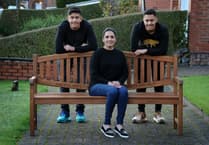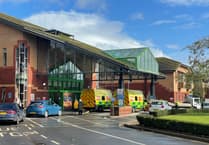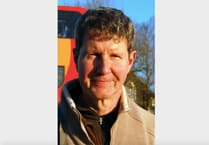The Times’ John Hutchins speaks to rural GP and author Dr Michael Sparrow about the publishing world and his many exciting travel adventures.
IF a doctor’s job is to ensure the wellbeing of their patients, then a GP in Lifton is proving the adage that ‘laughter is the best medicine.’
Dr Michael Sparrow, who apart from being one of - if not the longest serving current GP in West Devon and East Cornwall - has also had some success as an author, with his tales of medical mayhem while serving as a doctor in the RAF, in hospitals and as a local GP.
Michael, aged 58, has cared for his Lifton patients for the past 28 years and has a special interest in rheumatology and musculoskeletal medicine.
He penned two popular paperbacks, Country Doctor, Tales of A Rural GP and Repeat Prescription - selling between 70,000 and 100,000 copies.
They recalled tales drawn from Michael’s experience as a medical practitioner: like the time he found a very large dead body on a Mexican beach; or an unidentified corpse by a Devon cowshed when the herd was due in for milking; dealing with a drug runner rescued from the Caribbean Sea who pulled a gun on him; trying to react to a patient who claimed to have been abducted by aliens; a blind man who refuses to stop driving or the little old lady who presented him with a supermarket bag stuffed with £20 notes!
These entertaining books came out 12 years ago but now Michael has temporarily put down the stethoscope and picked up the pen once more to write two more books - this time about his travels. In particular the books touch on visits to places which have had their problems over the years such as Kosovo, a hot spot of the Balkan Crisis in the 1980s, and Ethopia, torn apart by war and famine.
He told the Times: ‘My first two books started when I had a back injury and I couldn’t do much for six months. I was bored stupid and wanted something to do. So I thought of all the different amusing stories that had happened to me as a doctor and put them all together, changing the names or even the sexes and trying to write in a style where people would not recognise themselves.
‘When Country Doctor, Tales of A Rural GP came out people said they enjoyed it and wanted to be in it, while others joked if they knew I was going to write they wouldn’t have chosen me as a doctor in the first place!’
Originally from Northamptonshire, Michael qualified in 1981 from St Mary’s Hospital in Paddington. He joined the RAF and served as a medical officer at RAF Chivenor in North Devon, working with the search and rescue crews. A spell in South Wales was followed by a posting to Belize, in Central America.
‘I was posted there just after the Falklands War (early 1980s). It was either six months in Belize or four and a half years in the Falklands,’ said Michael.
‘I loved it. My job was to assess air/medical evacuations and I spent most of my time in a helicopter. I had a great time.’
Another more challenging post came when he worked at the Defence Medical Rehabilitation Centre in Surrey, a place now synonymous with the Help for Heroes Campaign. He worked in rehabilitation and rheumatology and dealing with head injuries.
‘Although there were no wars at that time involving British Forces the work was interesting and we even had many professional footballers coming to us who had cruciate ligament injuries. I would have liked to stay but getting a permanent post there I would have had to wait at least five more years.’
He then moved to RAF Wroughton, near Swindon, as a medical officer.
‘I always wanted to be a plastic surgeon - not one who deals with cosmetics - but one that puts people back together.’
However, eventually Michael ended up as a GP and he settled, with his wife Laura, in Lifton in the mid-1980s.
‘I hated the thought of having to spend the rest of my days as a GP but when I became one I found you never knew who was going to come in next through the door. Some were bad cases, others difficult. I began to get to know my patients and their families. Now, I‘ve been here so long I now see the grandchildren of my patients who were here when I first came!’
Michael found himself taking part in other fascinating travels outside of his RAF postings. He was asked to go along to a charity convoy in Kosovo by a friend who was in the Launceston Lions Club, to deliver relief supplies. The civil war there was ending and there was little danger but Michael thought it would be a great experience so he volunteered.
He also ended up going to Ethiopia as part of a vaccination programme for the charity CARE — which he ended up doing after a conversation in a hospital corridor.
‘We worked on the Somalian border, looking after the thousands of refugees and providing water supplies. I must admit I got a little cynical about charities because the more care you put in the less the Ethiopians did for themselves.
‘Mind you it was quite an experience and it was not unusual to walk down the street and having to step over dead bodies!’
Just as in Kosovo Michael kept a diary of his Ethiopian trips - a useful source of material for his latest books. His first venture into publishing was when he showed some early chapters of Country Doctor, Tales of A Rural GP to established author and journalist Graham Hancock, who lives in the area and has won literary awards for his works on unconventional theories, the supernatural. aliens and ancient civilisations.
‘He liked it and said it was good enough to send off to a publishers. He suggested I contact a small to middle sized publisher as I would have a better chance of success but warned me, be prepared for rejection!
‘So thinking that my manuscript would be just one of a hundred or so to land on a publisher’s desk at any time I selected the vilest lime green folder I could find. After sending it off a few days later I got a phone call from the publishers Constable and Robinson, and the woman there said she had picked up mine because of the hideous folder from out of about 40 black ones, started to read it and liked what she saw!’
Michael said the publishers could not have been more helpful to a first time author.
‘My mother was dying and I wanted her to see a copy of of Country Doctor, Tales of A Rural GP before she died. When I told the publishers they presented me with one special copy to give to her, three months before it was available to the public. Unfortunately, though, she never got to see it but she did see a manuscript. and when she read it, I really wanted to know what she thought. She said to me so, that’s what you did for a living.’
His second book was not as well promoted as the first, where radio interviews were organised. but with the second there was hardly any fuss.
‘Whereas the first book they could not have been more helpful; in the second it was if they thought oh well, done that, let’s try another author.
‘The first thing you notice of the popular books of James Herriot and the life of a Yorkshire vet is a funny cartoon on the front cover, it catches the eye. Mine was quite drab. My books were published in Czechoslavkia. When I asked why they said apparently James Herriot is big in that country, just like Norman Wisdom in Albania!’
Michael soon discovered the fickle nature of the publishing world.
‘One day I was told that it was going to be Book of the Month at Ottaker Bookshops only to find that the next day it was replaced by something else. There was even a possibility of a television series coming from it but unfortunately for me Doc Martin came on to the screen set in North Cornwall and that put a kibosh to that.’
Although still very much a working GP, Michael has just completed his next books about his travels and is now looking for the right publisher.
With such a busy and fulfilling job, why does he devote such time to producing a book about his travels?
‘You could ask why would anyone want to read about an unknown doctor from Devon or Cornwall like me and his travels. I didn’t know much about what my father did and his stories which I would have loved to know about. I have four children — Charlie, Cressida, Archie and Persephone — and I write partly for them, so they could see for themselves what their dad did for a living!’
Whatever the reason, if they are anything like his first two books they are bound to be a good read and no doubt the patients in Lifton will be wondering if there might be a reference to them somewhere in the pages!



